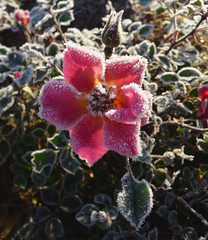
Frost on a rose bush in my front yard
(click on image to enlarge)
When the Frost is on the Punkin
by James Whitcomb Riley
WHEN the frost is on the punkin and the fodder's in the shock,
And you hear the kyouck and gobble of the struttin' turkey-cock,
And the clackin' of the guineys, and the cluckin' of the hens,
And the rooster's hallylooyer as he tiptoes on the fence;
O, it's then the time a feller is a-feelin' at his best,
With the risin' sun to greet him from a night of peaceful rest,
As he leaves the house, bareheaded, and goes out to feed the stock,
When the frost is on the punkin and the fodder's in the shock.
* * *
The husky, rusty russel of the tossels of the corn,
And the raspin' of the tangled leaves as golden as the morn;
The stubble in the furries—kindo' lonesome-like, but still
A-preachin' sermuns to us of the barns they growed to fill;
The strawstack in the medder, and the reaper in the shed;
The hosses in theyr stalls below—the clover overhead!—
O, it sets my hart a-clickin' like the tickin' of a clock,
When the frost is on the punkin and the fodder's in the shock.
* * *
I don't know how to tell it—but ef such a thing could be
As the angels wantin' boardin', and they'd call around on me—
I'd want to 'commodate 'em—all the whole-indurin' flock—
When the frost is on the punkin and the fodder's in the shock.
Here is Hamlin Garland, writing a recollection for the American Academy of Arts and Letters in 1922:
In 1892 I visited Riley at his native town of Greenfield, Indiana, and the town and country gave moving evidence of the wonder-working power of the poet. To my eyes it was the most unpromising field for art, especially for the art of verse. The landscape had no hills, no lakes, no streams of any movement or beauty. Ragged fence-rows, flat and dusty roads, fields of wheat alternating with clumps of trees — these were the features of a country which to me was utterly commonplace — and yet from this dusty, drab, unpromising environment Riley had been able to draw the honey of woodland poesy, a sweet in which a native fragrance as of basswood and buckwheat bloom mingled with hints of an English meadow and the tang of a Canada thistle.Garland's memoir, A Son of the Middle Border, gives the impression that he thought farming a miserable back-breaking business and that he was glad to have escaped its isolation and mental tedium, so perhaps some little corner of his mind thought Riley a sentimentalist, but if so he graciously kept that opinion to himself. On the other hand, Garland, sensitive to the beauty of the countryside, respectful and compassionate toward the people who farmed it, no doubt could appreciate Riley's ability to speak to the hearts of rural and small-town folk.
And speak to them he did; Riley was immensely popular in the late 19th and early 20th centuries. Hobart High School's yearbook of 1926 is dedicated to him.
So — no, Reader, I have not gone off on a tangent completely unrelated to Ainsworth. Because I'm sure that people in Ainsworth read and appreciated Riley's poems. And if I want to evoke the Ainsworth of a the early 20th century, I have to quote Riley and his like.
One thing that strikes me as I pore through those census reports is the prevalence of farming in local households. You go down the list of families, and it's farmer, wife, children; farmer, wife, children, widowed mother; farmer, wife, children, hired hand; farmer, wife, children, boarder; until you finally strike "retail merchant" or "tourist camp operator," and you think, "What's that weirdo doing here?"
Yesterday was a beautiful day, so I went to work outside. I dug in the heavy clay soil to plant raspberries, then I hauled 12 gallons to water them, then I hauled wheelbarrow after wheelbarrow of heavy, wet wood chips to mulch them.
So many times I paused in my work to stand in the sunshine, look up at the bright blue November sky, and listen to the silence. If only there were more of it! — but then, it's a rare and precious commodity around here. I think that cloud cover is somehow involved, as if the clouds reflected the noise back to earth, but on these windless, perfectly clear days, the distant roar of Route 30 goes up, up, up to eternity and I can almost hear the world without cars. Birds chirping, a breeze stirring the few leaves still on the trees, or rustling through the dried-out orchard grass; now and again a horse neighing, a dog barking, a human voice carrying through the clear air from the stable down the road.
It's the sort of scene that makes you want to get your camera and take a picture, but you know it's pointless because what the camera is going to produce is a small rectangular image of an ordinary fall landscape, not what you're seeing. If you were the poetizing type, you might write a poem, but then later generations will come along and think you an irritating sentimentalist, good only for historical purposes.
I do wonder how Ainsworth people of a hundred years ago felt about silence. They had it in spades — in their fields, in their houses; no cars, no radios, no televisions. They didn't need to stop to listen and marvel on a rare clear day. They had to exert themselves if they wanted not to hear it.
As Bronson Pinchot (of all people!) said in an interview with the Onion, "Well, everything there is so picturesque, you forget that the price of picturesque is boredom."
On the other hand, you have Riley's popularity as a historical fact.
I do wonder.


No comments:
Post a Comment